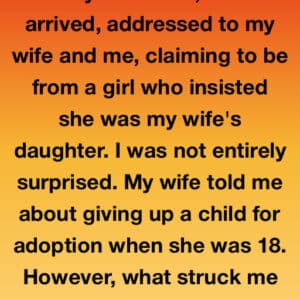I took my fiancé home to meet my parents. They loved him instantly, and the week felt easy and warm—until my sister arrived. The next morning, my parents went to work, and I decided to take a walk. Nothing dramatic, just a little air.
When I came back and opened the bedroom door, my world tilted.
My sister was sitting on the edge of the bed. Wearing my sweater. And my fiancé—shirtless—stood a few feet away, looking… confused. Not guilty. Not apologetic. Just unsure of what expression he was supposed to have.
None of us spoke.
I closed the door quietly and walked to the back porch. My whole body felt hollow. I stared at the fence and the birds hopping in the grass, trying to stitch together the pieces of what I saw. My sister. My fiancé. My sweater. My life twisting just slightly off its axis.
When he finally joined me outside, he rubbed his hands together like he was rehearsing his lines.
“It’s not what it looked like,” he said.
“Then what was it?”
“She came in while I was changing. She started crying. Said she felt alone. I was just comforting her.”
“And the sweater?”
“She said she was cold, so I told her to grab one.”
I watched him carefully. This man I had spent nearly three years with—studying late nights, traveling, talking about mortgages and baby names. I didn’t recognize him in that moment.
I didn’t scream. I didn’t accuse. I packed a bag and left.
Mila, my closest friend, let me stay with her. She made tea, listened, and then asked the question I hadn’t let myself think about:
“She’s done this before, hasn’t she?”
Yeah. High school. College. Little betrayals packaged as accidents. Small acts of sabotage dressed up as sisterly concern.
I stayed away for a few days.
When I returned to my parents’ house, my sister acted like nothing had happened. At dinner she passed me the garlic bread and chatted about a book like we were still best friends.
That night, I knocked on her door.
“I saw you,” I told her. “I want the truth.”
“Nothing happened,” she said immediately.
It was the way she said it—smooth, calm, practiced.
I asked if she was trying to ruin my life.
For just a second, something slipped in her expression. A flicker of something sharp and raw. Then it vanished.
“I’m not the villain,” she whispered. “Maybe if you weren’t so insecure, you’d still be engaged.”
That was the moment I knew.
I called off the wedding—not because I had proof of infidelity, but because the man I was supposed to marry lacked something essential: boundaries. Wisdom. Loyalty. The ability to step away from a bad situation even if it was innocent.
He didn’t fight it. Maybe he knew he’d already crossed a line.
My sister told everyone I was overreacting, jealous, dramatic. I didn’t defend myself. People who know you don’t need explanations.
Months passed. I rebuilt myself slowly. Traveled alone. Started therapy. Filled my life with people who felt like sunlight instead of storms.
Then, eight months later, my sister knocked on my door.
She looked nothing like the polished version of herself—no perfect hair, no smugness, no deflection. Just a tired young woman holding a lifetime of unspoken truths.
“I was jealous of you,” she said. “I always felt like I was in your shadow. Like you were everything I wasn’t.”
She explained everything. How she chased the attention I got. How she thought taking something from me—even a moment with my fiancé—would make her feel valuable. She admitted she tried to get close to him.
“He didn’t touch me,” she said. “He kept his distance. Said he loved you. But I wanted to win. And I’m not proud of that.”
Then she said the words I never expected:
“I’m getting help. I’m trying to stop being this person. And I’m sorry.”
It wasn’t perfect. But it was real.
We didn’t snap back into sisterhood. But we began again—slowly, honestly, without pretending the past didn’t exist.
A year later, she met Marcus. Kind. Steady. Not the kind of man she used to chase. He loved her gently. And she loved him back without games.
At her wedding, she asked me to stand beside her.
“I want you there,” she said. “Because I wouldn’t be here without you.”
And I believed her.
As for me—love returned, in its own time. Quiet, steady, thoughtful love. His name is Ruben. A schoolteacher with warm eyes who doesn’t play power games or flirt with my sister in a borrowed sweater. When he met her, he said, “I hear you’re protective of your sibling. Good. Families should protect each other.”
We all laughed, because now—we do.
Looking back, that moment at the bedroom door didn’t destroy my life. It exposed the cracks I’d been ignoring and forced me to build something stronger.
So if you’re standing in front of your own metaphorical bedroom door, wondering whether your gut is lying to you—it’s probably not.
Trust it.
Walking away doesn’t mean losing. Sometimes, it’s the first step toward the life and love you truly deserve.
And if someone who hurt you comes back with real change—not excuses, not manipulation, but change—listen to your heart. Just don’t forget what it took to get there.
Life has a way of revealing the truth eventually.
And sometimes, the people who once broke you become the ones who grow the most.
If this story made you feel seen, understood, or less alone—share it. Someone out there might need the reminder that choosing yourself is always the right choice.





